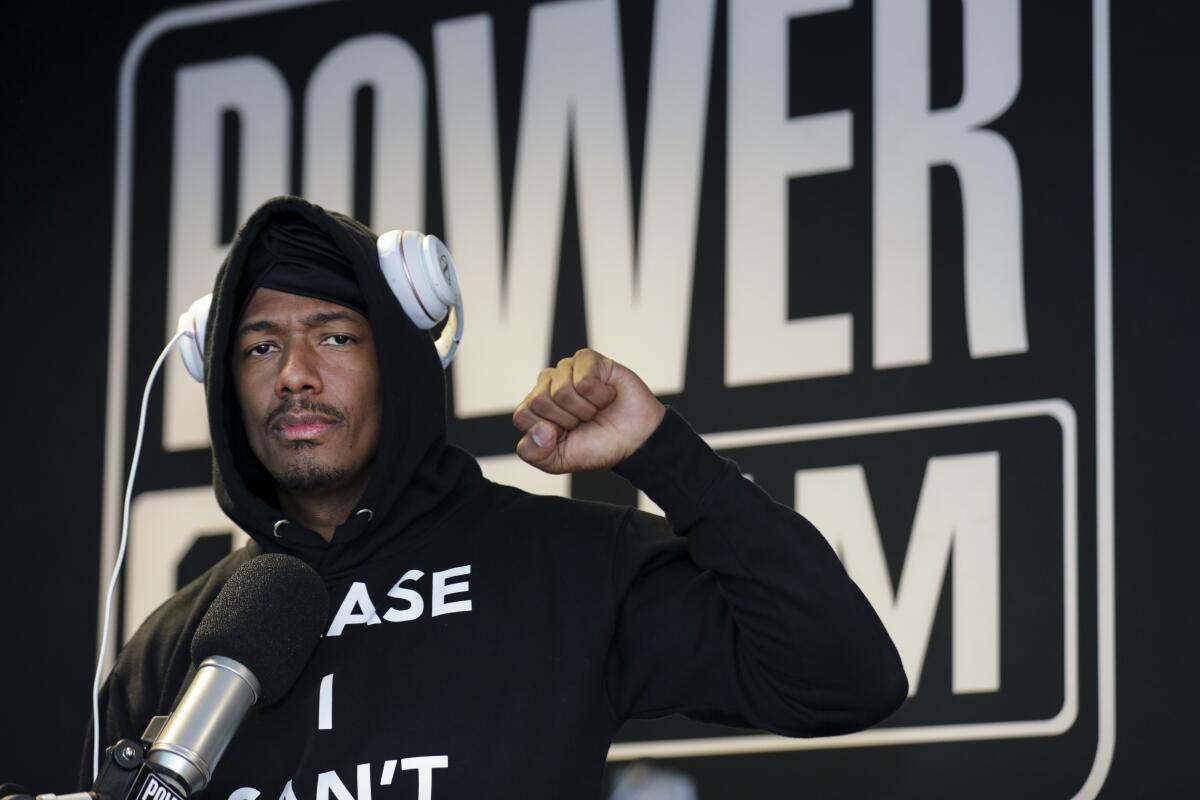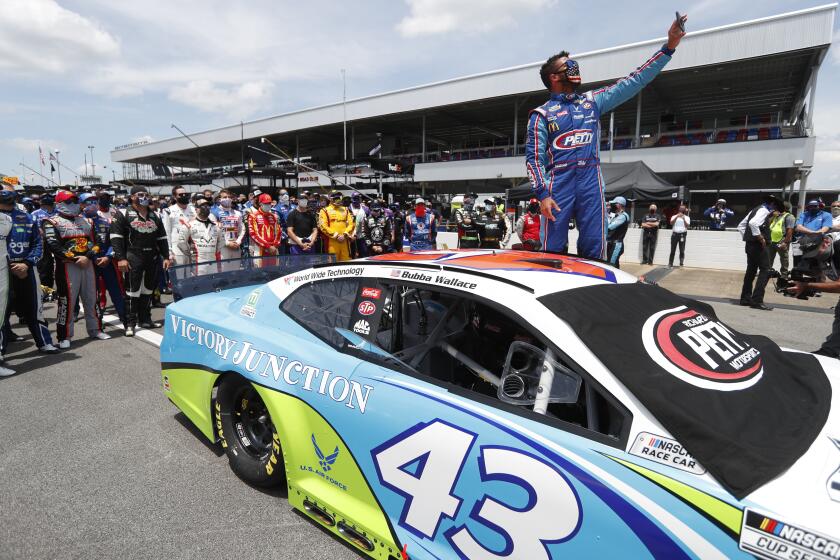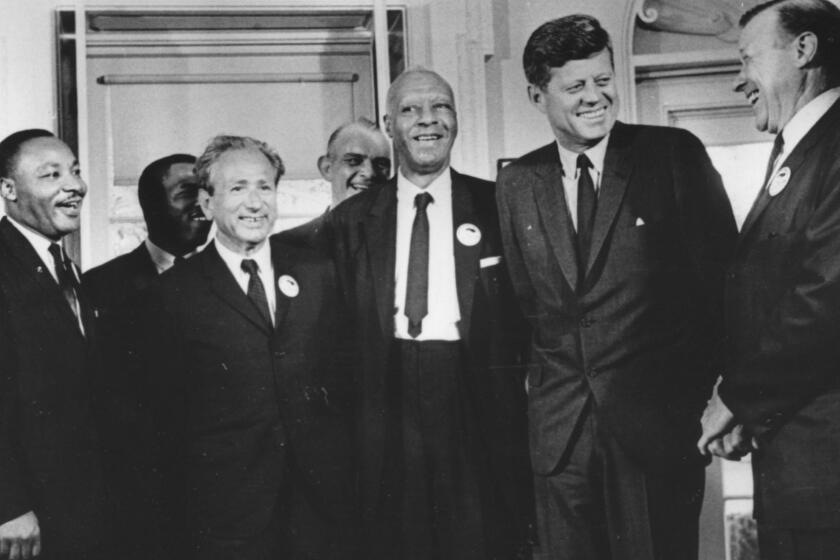My first brush with Black anti-Semitism came early. It was wrong then. It’s wrong now

- Share via
Much like anti-Black sentiment isn’t always manifested by slurs, anti-Semitism doesn’t always come with a lighted marquee. It’s subtle — shrouded in absent-minded stereotyping, unchallenged colloquialisms, tepid rebukes of inflammatory remarks like the ones recently made by DeSean Jackson and Nick Cannon or, even worse, no rebukes at all.
Jackson, a star wide receiver with the Philadelphia Eagles, has apologized for his Instagram post of an anti-Semitic quote attributed to Adolf Hitler; and Cannon has issued two apologies for anti-Semitic comments made on his podcast, “Cannon’s Class,” during an interview with Richard Griffin (aka Professor Griff, formerly the “Minister of Information” for the hip-hop group Public Enemy). For Cannon, though ViacomCBS cut ties with him, his contrition was enough for Fox, which is keeping him on as host of its hit competition series “The Masked Singer.”
Both Jackson and Cannon have pledged to educate themselves on the subject, a move that would have served everyone better if they had done that before slandering an entire group of people with hurtful conspiracies and accusations. And of course one can’t help but wonder if this newfound desire to learn more is sincere or simply self-preservation. I genuinely hope it is the former. No group owns suffering and no one is too old to grow.
My first brush with anti-Semitism started at home. My family didn’t collect Nazi memorabilia or anything conspicuous like that. Growing up, one of my favorite things to do was visit family members in Chicago. I loved the cookouts, music and trips to the Maxwell Street Market many residents “affectionately” referred to as “Jewtown.” One day I asked a family member why it was called that and she said it was because before buying anything we had to first “jew the price down.”
For 40 years that conversation has stuck with me. I didn’t have the vocabulary to express or fully understand it back then but I knew enough to feel that there was something fundamentally wrong with the name “Jewtown” and how it was talked about. Despite growing up in the segregated South, I never heard my relatives speak ill of white people and I’m sure no one felt that line of thinking — that shorthand stereotyping — was harmful.
But it was. Still is. And those words coming from a Black person doesn’t change that.
NASCAR responded to a noose in Bubba Wallace’s garage with a show of support for its only Black driver, but its fight remains with the Confederate flag, columnist LZ Granderson writes.
By the time I got to college, I had become intrigued by the message of Minister Louis Farrakhan and the teachings of the Nation of Islam. This was during the height of Gen X Afrocentricity. I was wearing leather necklaces with medallions shaped like Africa, engaged in spirited conversations about “The Isis Papers” — Dr. Frances Cress Welsing’s bestselling 1992 book about the psychiatry of racism — while X-Clan was playing in the background.
The first march/protest I ever attended as an adult was the Million Man March in 1995. A bunch of us from college rode in a university van to Washington, D.C., to hear Farrakhan share his thoughts on what Black men needed to do to uplift our communities. I fondly remember all of us singing along to “Ain’t No Stopping Us Now” by McFadden & Whitehead as we approached the city.
It was incredibly powerful to see so many brothers — young and old — gathered for the sole purpose of making a difference back home. Because of that day and Minister Farrakhan, I began reading more; worked to help underserved youth; even walked the streets with my church to disrupt drug dealers on the corners and discourage gang violence.
I tried my best to ignore the occasional anti-Semitic sermon that reminded me of the day I was told to “jew the price down.” Eventually Farrakhan’s repulsive words about the Jewish community became too much for me to ignore. I just don’t believe you need to tear another group down in order to lift your group up. Exposing lies and dismantling unjust systems I’m all here for — but talk of white devils? Nah, man, that just ain’t how I’m built. And if a popular leader were to refer to my community as Black devils, I’m sure the response would be adjusted accordingly.
The bravery of some Jews in the civil rights movement did not necessarily reflect American Jewish attitudes at that time.
There is something troubling about our society’s tendency to explain away or justify anti-Semitism. This hypocrisy has been made particularly evident during this age of racial reckoning. A time in which a Drew Brees can be raked across the coals by his peers for mischaracterizing Colin Kaepernick’s protest but many of those same peers all but ignore Jackson’s thinking Hitler was a good source to quote. Part of this has to do with ignorance.
As I said earlier, my family didn’t mean any harm with their stereotypes, they just didn’t know any better. Jackson and to a degree Cannon also voiced a lack of clarity on the issues in their subsequent apologies. (“I feel ashamed of the uninformed and naive place that these words came from,” Cannon tweeted Wednesday.) But the ignorance of the offender doesn’t explain away everything about these recent episodes. It doesn’t explain why public chastisement over anti-Semitic comments is fairly muted when compared to the reaction to racists’ remarks. It doesn’t explain why some Black people feel that disparaging Jewish people is an essential element to liberation.
Personally, I don’t think forcing a man onto his knees makes me taller.
In fact, I believe it has the opposite effect because it undermines the very principle that the struggle for equality is rooted in: to be judged by the content of our character. I hope before the next person of note — Black or otherwise — decides to share some thoughts on an entire group of people they remember that.
More to Read
The biggest entertainment stories
Get our big stories about Hollywood, film, television, music, arts, culture and more right in your inbox as soon as they publish.
You may occasionally receive promotional content from the Los Angeles Times.













